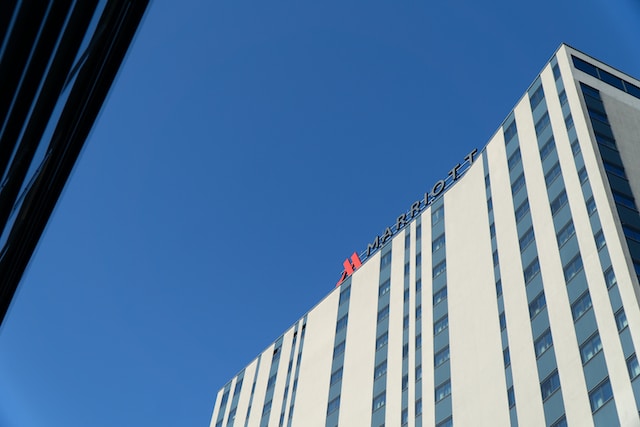Before we dive deep into the SWOT analysis, let’s get the business overview of Marriott. Marriott International is a leading global hospitality company offering a diverse portfolio of brands and accommodations across various price points and markets. The company, founded in 1927 by J. Willard and Alice Marriott, has become one of the world’s largest hotel chains.
As of 2022, Marriott operated over 8,000 properties under 30 brands in over 130 countries and territories, including 2,053 company-operated properties (576,243 rooms) and 6,122 franchised and licensed properties (937,683 rooms and timeshare units).
The company’s portfolio includes luxury, premium, select, and longer-stay properties, allowing Marriott to cater to various customer preferences and needs. Some of their well-known brands include Marriott, Ritz-Carlton, Sheraton, Westin, Courtyard, Residence Inn, and Aloft.
Marriott operates on a primarily franchise-based model, which enables the company to expand rapidly while minimizing capital investments. In addition to its franchised properties, Marriott also manages a smaller number of owned and leased hotels.
The company’s business strategy focuses on continuously expanding its global footprint, enhancing its loyalty program (Marriott Bonvoy), and leveraging technology to improve guest experiences and operational efficiency.
- For 2022, gross fee revenues totaled $4.1 billion, a significant increase of more than 50 percent compared to 2021.
- Marriott generated a net income of $2.4 billion, a 140% increase from 2021.
- At year-end 2022, Marriott’s total debt was $10.1 billion, and cash and equivalents totaled $0.5 billion.
Here is the SWOT analysis for Marriott
A SWOT analysis is a strategic planning tool used to evaluate the Strengths, Weaknesses, Opportunities, and Threats of a business, project, or individual. It involves identifying the internal and external factors that can affect a venture’s success or failure and analyzing them to develop a strategic plan. In this article, we do a SWOT Analysis of Marriott.
SWOT Analysis: Meaning, Importance, and Examples
Strengths
- A diverse portfolio of brands: Marriott’s portfolio includes more than 30 brands across various segments, such as luxury, premium, select, and extended stay properties. This diverse brand offering allows Marriott to cater to a wide range of customer preferences and needs, making it attractive to different types of travelers.
- Global presence: With over 8000 properties in more than 130 countries and territories, Marriott’s strong international presence provides a competitive edge. This extensive network offers guests a variety of options when choosing accommodations and increases brand recognition.
- Strong loyalty program: Marriott Bonvoy, the company’s loyalty program, offers attractive rewards and incentives for frequent travelers. With millions of members, the program helps generate repeat business, fosters brand loyalty and contributes to the company’s overall revenue.
- Franchise-based business model: Marriott primarily operates on a franchise model, allowing it to expand rapidly with lower capital investments than owning and operating all its properties. This model also provides a steady stream of franchise fees and management contracts, generating a stable revenue stream.
- Focus on technology and innovation: Marriott invests in technology to enhance guest experiences, streamline operations, and improve efficiency. This includes adopting mobile apps and contactless services and implementing artificial intelligence and data analytics to personalize guest experiences and optimize revenue management.
- Solid reputation and brand value: Marriott is known for its high-quality service, customer satisfaction, and overall brand value. This strong reputation has allowed the company to attract and retain both guests and franchise partners.
- Corporate responsibility and sustainability: Marriott is committed to environmental stewardship and social responsibility. The company has various initiatives to reduce its environmental impact, promote diversity and inclusion, and support local communities, contributing to its positive image and long-term success.

Weaknesses
- Dependence on the franchise model: While the franchise-based business model has its advantages, it also exposes Marriott to risks associated with franchisee non-compliance or underperformance. The company’s reputation may be impacted if franchisees fail to maintain brand standards or have any legal or operational issues with their properties.
- Vulnerability to economic fluctuations: The hospitality industry is sensitive to economic conditions, and Marriott’s business can be adversely affected during economic downturns. Travelers may reduce discretionary spending during tough economic times, leading to lower occupancy rates and decreased revenue.
- Intense competition: Marriott faces strong competition from other global hotel chains and emerging players like Airbnb and other alternative lodging providers. This competition may lead to price wars, eroding profit margins, and making it difficult for Marriott to maintain or grow its market share.
- Dependence on key markets: Although Marriott has a global presence, its properties, and revenue are concentrated in the United States. This reliance on a single market exposes the company to risks associated with economic, political, or regulatory changes in that region.
- Data security concerns: The hospitality industry has been a target for cyber attacks, and Marriott has experienced data breaches in the past. Ensuring the security of customer information is crucial for maintaining the trust and protecting the company’s reputation. Any future data breaches may lead to legal liabilities, financial losses, and negative publicity.
- Limited control over owned and leased properties: Marriott has fewer owned and leased properties than franchised ones. ~75% of Marriott’s properties are franchises. The company’s control over these properties is limited, which may impact its ability to drive operational efficiency and maintain brand consistency across all its properties.
- Labor issues and unionization: Marriott’s operations rely on a large workforce, and labor-related challenges such as wage disputes, employee dissatisfaction, and unionization can affect the company’s performance and reputation. Ensuring a stable and satisfied workforce is crucial for maintaining service quality and smooth operations.
Opportunities
- Expansion in emerging markets: Marriott can tap into the growing demand for hospitality services in emerging markets like Asia-Pacific, Latin America, and Africa. These regions offer significant growth potential due to rising disposable incomes, urbanization, and an expanding middle class.
- Targeting the millennial and Gen Z market: As younger generations become more influential consumers, Marriott can develop and promote brands that cater specifically to their preferences, focusing on sustainability, technology, and unique experiences.
- Growth in the alternative lodging market: Marriott can explore opportunities in the alternative lodging sector, such as vacation rentals, serviced apartments, and co-living spaces. This will help diversify the company’s offerings and allow it to compete more effectively with platforms like Airbnb.
- Leveraging technology and innovation: Marriott can continue to invest in technology to enhance guest experiences and streamline operations. This includes adopting advanced analytics, artificial intelligence, and automation to optimize revenue management, improve personalization, and increase operational efficiency.
- Strengthening loyalty programs and partnerships: Marriott can expand and enhance its Marriott Bonvoy loyalty program to offer more attractive rewards, exclusive benefits, and personalized experiences. The company can also pursue strategic partnerships with airlines, car rental companies, and other travel-related businesses to create a more comprehensive loyalty ecosystem.
- Focus on sustainable and responsible tourism: As sustainability becomes an increasingly important factor for travelers, Marriott can further develop its eco-friendly initiatives and promote responsible tourism. This will attract environmentally conscious customers and help the company reduce costs and mitigate environmental risks.
- Mergers and acquisitions: Marriott can explore strategic acquisitions of hotel chains or other hospitality businesses to strengthen its market position, expand its portfolio, and increase operational efficiency through synergies.
- Capitalizing on business travel recovery: As the global economy recovers and business travel resumes post-pandemic, Marriott can focus on attracting corporate clients and meeting their specific needs through tailored services and amenities.
- Health and wellness tourism: Marriott can tap into the growing demand for health and wellness-focused travel experiences by incorporating wellness facilities, programs, and services into its properties, targeting health-conscious travelers and creating a competitive edge.
Threats
- Economic downturns: Economic fluctuations can significantly impact the hospitality industry, as discretionary spending on travel and accommodations tends to decline during recessions. During economic downturns, Marriott’s business may suffer from reduced occupancy rates and revenue.
- Intense competition: Marriott faces intense competition from established hotel chains and emerging players such as Airbnb and other alternative lodging providers. This competition may lead to price wars and make it difficult for Marriott to maintain or grow its market share.
- Global health crises and travel restrictions: The COVID-19 pandemic has demonstrated the vulnerability of the hospitality industry to global health crises and travel restrictions. Future pandemics or similar events could severely impact Marriott’s business, leading to reduced demand, closures of properties, and financial losses.
- Regulatory changes and compliance: Changes in regulations or new laws, such as those related to taxes, labor, or environmental standards, could increase operating costs and impact Marriott’s profitability. Additionally, non-compliance with local or international regulations may result in fines, legal actions, and reputational damage.
- Currency fluctuations: Marriott’s financial performance is exposed to currency fluctuations as a global company. Changes in exchange rates can impact the company’s revenue, expenses, and profitability.
- Natural disasters and climate change: Natural disasters, such as hurricanes, earthquakes, or floods, can cause significant damage to Marriott’s properties and disrupt operations. Moreover, the increasing frequency and severity of extreme weather events due to climate change may exacerbate these risks.
- Cybersecurity threats: The hospitality industry is vulnerable to cyber attacks, and Marriott has previously experienced data breaches. Cyber threats could lead to financial losses, legal liabilities, and reputational damage if sensitive customer or corporate data is compromised.
- Geopolitical tensions and terrorism: Political instability, geopolitical conflicts, and terrorism can adversely affect the travel industry and Marriott’s business. These factors can lead to reduced demand for accommodations, increased security costs, and potential damage to properties.
- Changing consumer preferences: The hospitality industry constantly evolves, and Marriott must adapt to shifting consumer preferences and trends. Failure to do so may result in a loss of market share and diminished brand loyalty.
- Labor issues and unionization: The hospitality industry relies heavily on human resources, and labor-related challenges such as wage disputes, employee dissatisfaction, and unionization can negatively impact Marriott’s operations, reputation, and overall performance.









